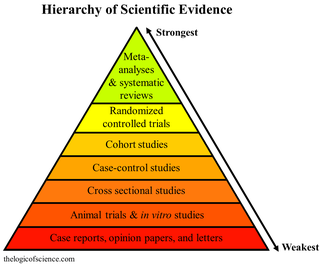Related Research Articles

Peer review is the evaluation of work by one or more people with similar competencies as the producers of the work. It functions as a form of self-regulation by qualified members of a profession within the relevant field. Peer review methods are used to maintain quality standards, improve performance, and provide credibility. In academia, scholarly peer review is often used to determine an academic paper's suitability for publication. Peer review can be categorized by the type of activity and by the field or profession in which the activity occurs, e.g., medical peer review. It can also be used as a teaching tool to help students improve writing assignments.

Cochrane is a British international charitable organisation formed to synthesize medical research findings to facilitate evidence-based choices about health interventions involving health professionals, patients and policy makers. It includes 53 review groups that are based at research institutions worldwide. Cochrane has approximately 30,000 volunteer experts from around the world.
In a blind or blinded experiment, information which may influence the participants of the experiment is withheld until after the experiment is complete. Good blinding can reduce or eliminate experimental biases that arise from a participants' expectations, observer's effect on the participants, observer bias, confirmation bias, and other sources. A blind can be imposed on any participant of an experiment, including subjects, researchers, technicians, data analysts, and evaluators. In some cases, while blinding would be useful, it is impossible or unethical. For example, it is not possible to blind a patient to their treatment in a physical therapy intervention. A good clinical protocol ensures that blinding is as effective as possible within ethical and practical constraints.

A systematic review is a scholarly synthesis of the evidence on a clearly presented topic using critical methods to identify, define and assess research on the topic. A systematic review extracts and interprets data from published studies on the topic, then analyzes, describes, critically appraises and summarizes interpretations into a refined evidence-based conclusion. For example, a systematic review of randomized controlled trials is a way of summarizing and implementing evidence-based medicine.
In medicine, a case report is a detailed report of the symptoms, signs, diagnosis, treatment, and follow-up of an individual patient. Case reports may contain a demographic profile of the patient, but usually describe an unusual or novel occurrence. Some case reports also contain a literature review of other reported cases. Case reports are professional narratives that provide feedback on clinical practice guidelines and offer a framework for early signals of effectiveness, adverse events, and cost. They can be shared for medical, scientific, or educational purposes.
Asim Kurjak is the President of International Academy of Perinatal Medicine and director of Ian Donald Inter-University School of Medical Ultrasound. He is a regular fellow of World Academy of Art and Science, European Academy of Sciences and Art, International Academy for Human Reproduction, Italian Academy of Science and Art of Reggio Puglia, Academy of Medical Sciences of Catalonia; honorary member of American Institute of Ultrasound in Medicine and Biology; regular member of Russian Academy of Science and Art.

John P. A. Ioannidis is a Greek-American physician-scientist, writer and Stanford University professor who has made contributions to evidence-based medicine, epidemiology, and clinical research. Ioannidis studies scientific research itself, meta-research primarily in clinical medicine and the social sciences.
A medical journal is a peer-reviewed scientific journal that communicates medical information to physicians, other health professionals. Journals that cover many medical specialties are sometimes called general medical journals.
Scholarly peer review or academic peer review is the process of having a draft version of a researcher's methods and findings reviewed by experts in the same field. Peer review is widely used for helping the academic publisher decide whether the work should be accepted, considered acceptable with revisions, or rejected for official publication in an academic journal, a monograph or in the proceedings of an academic conference. If the identities of authors are not revealed to each other, the procedure is called dual-anonymous peer review.

PRISMA is an evidence-based minimum set of items aimed at helping scientific authors to report a wide array of systematic reviews and meta-analyses, primarily used to assess the benefits and harms of a health care intervention. PRISMA focuses on ways in which authors can ensure a transparent and complete reporting of this type of research. The PRISMA standard superseded the earlier QUOROM standard. It offers the replicability of a systematic literature review. Researchers have to figure out research objectives that answer the research question, states the keywords, a set of exclusion and inclusion criteria. In the review stage, relevant articles were searched, irrelevant ones are removed. Articles are analyzed according to some pre-defined categories.
Metascience is the use of scientific methodology to study science itself. Metascience seeks to increase the quality of scientific research while reducing inefficiency. It is also known as "research on research" and "the science of science", as it uses research methods to study how research is done and find where improvements can be made. Metascience concerns itself with all fields of research and has been described as "a bird's eye view of science". In the words of John Ioannidis, "Science is the best thing that has happened to human beings ... but we can do it better."
Allegiance bias in behavioral sciences is a bias resulted from the investigator's or researcher's allegiance to a specific school of thought. Researchers/investigators have been exposed to many types of branches of psychology or schools of thought. Naturally they adopt a school or branch that fits with their paradigm of thinking. More specifically, allegiance bias is when this leads therapists, researchers, etc. believing that their school of thought or treatment is superior to others. Their superior belief to these certain schools of thought can bias their research in effective treatments trials or investigative situations leading to allegiance bias. Reason being is that they may have devoted their thinking to certain treatments they have seen work in their past experiences. This can lead to errors in interpreting the results of their research. Their “pledge” to stay within their own paradigm of thinking may affect their ability to find more effective treatments to help the patient or situation they are investigating.
Joseph Gavin Collier is a British retired clinical pharmacologist and emeritus professor of medicines policy at St George's Hospital and Medical School in London, whose early research included establishing the effect of aspirin on human prostaglandins and looking at the role of nitric oxide and angiotensin converting enzyme in controlling blood vessel tone and blood pressure. Later, in his national policy work, he helped change the way drugs are priced and bought by the NHS, and ensured that members of governmental advisory committees published their conflicts of interest.
Jacobs Publishers is a publisher of various international journals based in Hyderabad, India. Jacobs Publishers has been included on Beall's List of predatory open-access publishers and has faced other criticisms of its publishing practices.
In academic publishing, a sister journal, mirror journal or companion journal is a newer academic journal that is affiliated with an older, better-established journal in the same field.
BMJ USA: Primary Care Medicine for the American Physician was a monthly peer-reviewed medical journal published by the BMJ Group as a sister journal to the BMJ. It was intended to publish material specifically relevant to readers in the United States. It was established in 2001 and was discontinued permanently in 2005.
The World Association of Medical Editors is an international, virtual organization of editors of medical journals. It was originally founded in 1995 by a group of members of the International Committee of Medical Journal Editors (ICMJE), who had grown concerned that the ICMJE had become "too small, self-serving, and exclusive". It was launched on March 16, 1995 in Bellagio, Lombardy, Italy, after a three-day conference was held to discuss ways to enable greater international cooperation between editors of medical journals. The conference was attended by twenty-two editors from thirteen countries, all funded by the Rockefeller Foundation. One of those in attendance was Iain Chalmers. Any editor of a peer-reviewed biomedical journal is eligible to join WAME.
Virginia M. Barbour is a professor at Queensland University of Technology in Brisbane, Australia, and serves as the Director of the Australasian Open Access Strategy Group. She is best known for being one of the three founding editors of PLOS Medicine, and her various roles in championing the open access movement.
Stephen Penford Lock is an English haematologist and editor who served from 1975 to 1991 as editor-in-chief of the UK medical journal, the British Medical Journal, known since 1988 as the BMJ. A prominent scholar of the peer review process, he coined the term "journalology" to refer to the scientific study of the academic publishing process. In 1990, Eugene Garfield described him as "an elder statesman of biomedical editing".
Robert James Lee was an English physician. He published papers on diseases of children and on the "treatment of pulmonary phthisis by antiseptic vapours".
References
- ↑ Galipeau, James; Moher, David; Campbell, Craig; Hendry, Paul; Cameron, D. William; Palepu, Anita; Hébert, Paul C. (March 2015). "A systematic review highlights a knowledge gap regarding the effectiveness of health-related training programs in journalology". Journal of Clinical Epidemiology. 68 (3): 257–265. doi: 10.1016/j.jclinepi.2014.09.024 . PMID 25510373.
- ↑ Wilson, Mitch; Moher, David (March 2019). "The Changing Landscape of Journalology in Medicine". Seminars in Nuclear Medicine. 49 (2): 105–114. doi:10.1053/j.semnuclmed.2018.11.009. hdl: 10393/38493 . PMID 30819390. S2CID 73471103.
- 1 2 3 4 Couzin-Frankel, Jennifer (18 September 2018). "'Journalologists' use scientific methods to study academic publishing. Is their work improving science?". Science. Retrieved 4 May 2019.
- ↑ Burnham, John C. (1990-03-09). "The Evolution of Editorial Peer Review". JAMA: The Journal of the American Medical Association. 263 (10): 1323–1329. doi:10.1001/jama.1990.03440100023003. ISSN 0098-7484. PMID 2406470.
- ↑ American Heritage Dictionary of the English Language. 5th ed. Boston: Houghton Mifflin Harcourt, 2020. https://ahdictionary.com/word/search.html?q=reliable ("reliable, adj. 1. Capable of being relied on; dependable ... 2. Yielding the same or compatible results in different clinical experiments or statistical trials.").
- ↑ Oxford English Dictionary (OED Online) (2nd ed.). Oxford, UK: Oxford University Press. 1989.
validity, n. ... 2. The quality of being well-founded on fact, or established on sound principles, and thoroughly applicable to the case or circumstances; soundness and strength (of argument, proof, authority, etc.) ... 4. Value or worth; efficacy. Merging into sense 2, from which in some instances it is hardly distinguishable.
- ↑ Nederhof, A.J. (1988), "The Validity and Reliability of Evaluation of Scholarly Performance", Handbook of Quantitative Studies of Science and Technology, Elsevier, pp. 193–228, doi:10.1016/b978-0-444-70537-2.50012-x, ISBN 978-0-444-70537-2 , retrieved 15 September 2020
- ↑ Smith, J (3 October 1990). "Journalology – or what editors do". BMJ: British Medical Journal. 301 (6754): 756–759. doi:10.1136/bmj.301.6754.756. ISSN 0959-8138. PMC 1664073 . PMID 2224255.